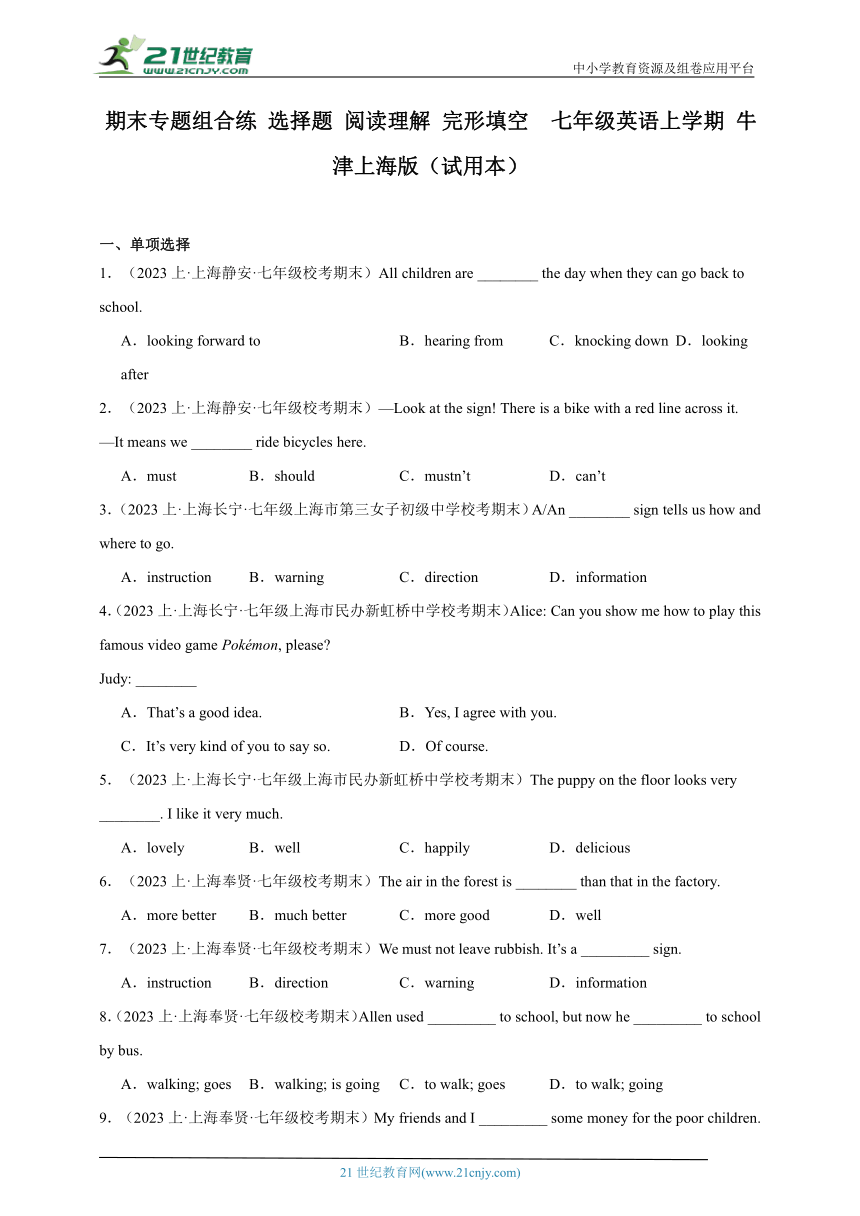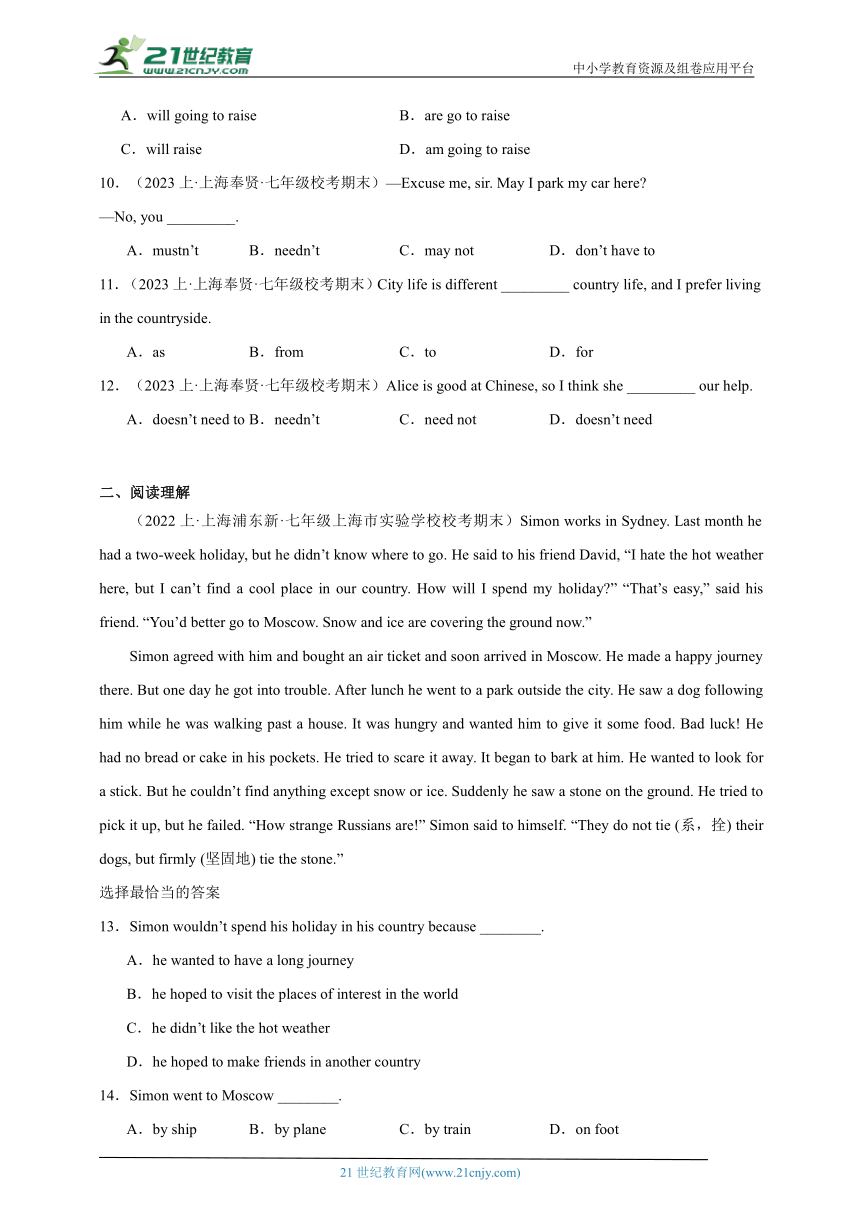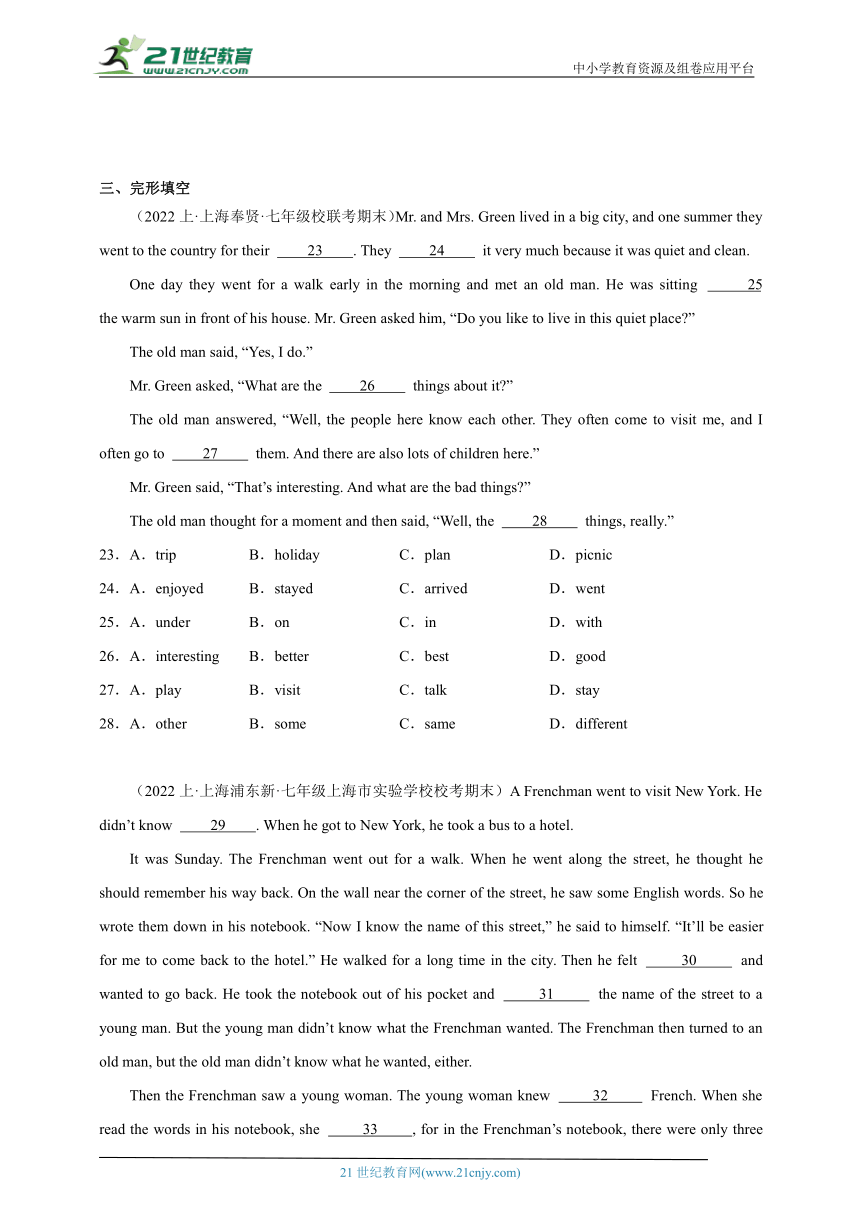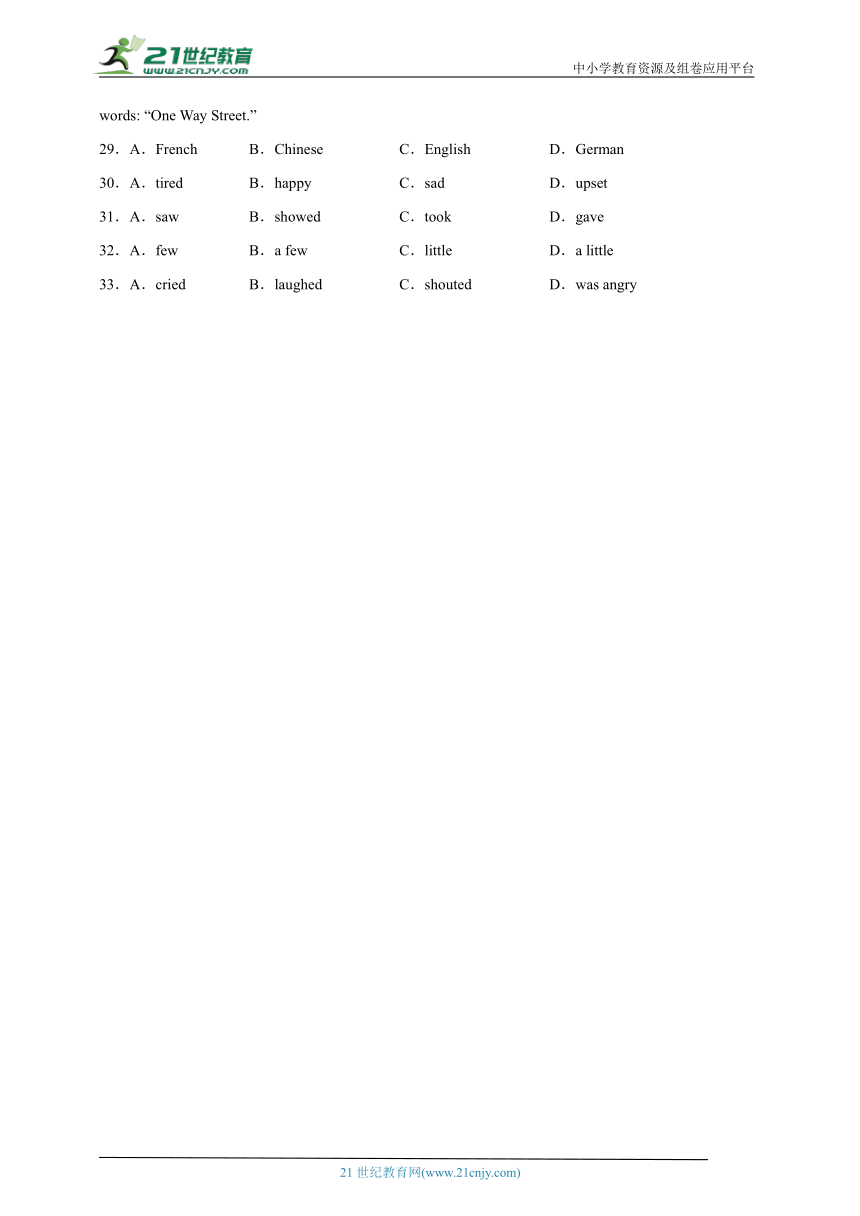期末专题组合练 选择题+阅读理解+完形填空(含解析) 七年级英语上学期 牛津上海版(试用本)
文档属性
| 名称 | 期末专题组合练 选择题+阅读理解+完形填空(含解析) 七年级英语上学期 牛津上海版(试用本) |

|
|
| 格式 | docx | ||
| 文件大小 | 282.6KB | ||
| 资源类型 | 试卷 | ||
| 版本资源 | 牛津上海版(试用本) | ||
| 科目 | 英语 | ||
| 更新时间 | 2024-01-12 15:00:57 | ||
图片预览





文档简介
中小学教育资源及组卷应用平台
期末专题组合练 选择题 阅读理解 完形填空 七年级英语上学期 牛津上海版(试用本)
一、单项选择
1.(2023上·上海静安·七年级校考期末)All children are ________ the day when they can go back to school.
A.looking forward to B.hearing from C.knocking down D.looking after
2.(2023上·上海静安·七年级校考期末)—Look at the sign! There is a bike with a red line across it.
—It means we ________ ride bicycles here.
A.must B.should C.mustn’t D.can’t
3.(2023上·上海长宁·七年级上海市第三女子初级中学校考期末)A/An ________ sign tells us how and where to go.
A.instruction B.warning C.direction D.information
4.(2023上·上海长宁·七年级上海市民办新虹桥中学校考期末)Alice: Can you show me how to play this famous video game Pokémon, please
Judy: ________
A.That’s a good idea. B.Yes, I agree with you.
C.It’s very kind of you to say so. D.Of course.
5.(2023上·上海长宁·七年级上海市民办新虹桥中学校考期末)The puppy on the floor looks very ________. I like it very much.
A.lovely B.well C.happily D.delicious
6.(2023上·上海奉贤·七年级校考期末)The air in the forest is ________ than that in the factory.
A.more better B.much better C.more good D.well
7.(2023上·上海奉贤·七年级校考期末)We must not leave rubbish. It’s a _________ sign.
A.instruction B.direction C.warning D.information
8.(2023上·上海奉贤·七年级校考期末)Allen used _________ to school, but now he _________ to school by bus.
A.walking; goes B.walking; is going C.to walk; goes D.to walk; going
9.(2023上·上海奉贤·七年级校考期末)My friends and I _________ some money for the poor children.
A.will going to raise B.are go to raise
C.will raise D.am going to raise
10.(2023上·上海奉贤·七年级校考期末)—Excuse me, sir. May I park my car here
—No, you _________.
A.mustn’t B.needn’t C.may not D.don’t have to
11.(2023上·上海奉贤·七年级校考期末)City life is different _________ country life, and I prefer living in the countryside.
A.as B.from C.to D.for
12.(2023上·上海奉贤·七年级校考期末)Alice is good at Chinese, so I think she _________ our help.
A.doesn’t need to B.needn’t C.need not D.doesn’t need
二、阅读理解
(2022上·上海浦东新·七年级上海市实验学校校考期末)Simon works in Sydney. Last month he had a two-week holiday, but he didn’t know where to go. He said to his friend David, “I hate the hot weather here, but I can’t find a cool place in our country. How will I spend my holiday ” “That’s easy,” said his friend. “You’d better go to Moscow. Snow and ice are covering the ground now.”
Simon agreed with him and bought an air ticket and soon arrived in Moscow. He made a happy journey there. But one day he got into trouble. After lunch he went to a park outside the city. He saw a dog following him while he was walking past a house. It was hungry and wanted him to give it some food. Bad luck! He had no bread or cake in his pockets. He tried to scare it away. It began to bark at him. He wanted to look for a stick. But he couldn’t find anything except snow or ice. Suddenly he saw a stone on the ground. He tried to pick it up, but he failed. “How strange Russians are!” Simon said to himself. “They do not tie (系,拴) their dogs, but firmly (坚固地) tie the stone.”
选择最恰当的答案
13.Simon wouldn’t spend his holiday in his country because ________.
A.he wanted to have a long journey
B.he hoped to visit the places of interest in the world
C.he didn’t like the hot weather
D.he hoped to make friends in another country
14.Simon went to Moscow ________.
A.by ship B.by plane C.by train D.on foot
15.________, so Simon went to spend his holiday there.
A.It was cold in Moscow
B.There were many good places for skating in Moscow
C.The things in Moscow were very cheap
D.He could save much money in Moscow
16.Which of the following is TRUE
A.Russians are all strange.
B.Russians never tie their dogs.
C.Russians always firmly tie the dogs.
D.The stone was firmly fixed on the ground.
17.Simon couldn’t find a stick because ________.
A.there weren’t any trees in Moscow in winter
B.the snow and the ice were covering the ground
C.the Russians took all the sticks home
D.the Russians were afraid to hurt their dogs
(2022上·上海浦东新·七年级上海市实验学校校考期末)In Japan, people eat their food with chopsticks. Dishes there are carefully cooked. At mealtime, dishes are placed in the centre of a table and each person helps himself or herself.
The traditional (传统的) Japanese food mainly includes rice, fish and vegetables. Rice is important food in Japan. There is much fresh fish and other seafood in the country.
This is because no place in the country is too far from the sea. Many different kinds of fish are found in the sea around Japan. Japanese fishermen use modern fishing methods (方法) to catch fish and Japan is one of the countries that catches the most fishes in the world.
As their food is so healthy, it is not surprising that most Japanese can live longer.
True or False.
18.Japanese use chopsticks to eat their food.
19.Most Japanese only eat fish and rice for meals.
20.Many kinds of fish are found in the sea around Japan.
21.Japanese fishermen catch fish in a simple way.
22.Healthy food can help people live longer.
三、完形填空
(2022上·上海奉贤·七年级校联考期末)Mr. and Mrs. Green lived in a big city, and one summer they went to the country for their 23 . They 24 it very much because it was quiet and clean.
One day they went for a walk early in the morning and met an old man. He was sitting 25 the warm sun in front of his house. Mr. Green asked him, “Do you like to live in this quiet place ”
The old man said, “Yes, I do.”
Mr. Green asked, “What are the 26 things about it ”
The old man answered, “Well, the people here know each other. They often come to visit me, and I often go to 27 them. And there are also lots of children here.”
Mr. Green said, “That’s interesting. And what are the bad things ”
The old man thought for a moment and then said, “Well, the 28 things, really.”
23.A.trip B.holiday C.plan D.picnic
24.A.enjoyed B.stayed C.arrived D.went
25.A.under B.on C.in D.with
26.A.interesting B.better C.best D.good
27.A.play B.visit C.talk D.stay
28.A.other B.some C.same D.different
(2022上·上海浦东新·七年级上海市实验学校校考期末)A Frenchman went to visit New York. He didn’t know 29 . When he got to New York, he took a bus to a hotel.
It was Sunday. The Frenchman went out for a walk. When he went along the street, he thought he should remember his way back. On the wall near the corner of the street, he saw some English words. So he wrote them down in his notebook. “Now I know the name of this street,” he said to himself. “It’ll be easier for me to come back to the hotel.” He walked for a long time in the city. Then he felt 30 and wanted to go back. He took the notebook out of his pocket and 31 the name of the street to a young man. But the young man didn’t know what the Frenchman wanted. The Frenchman then turned to an old man, but the old man didn’t know what he wanted, either.
Then the Frenchman saw a young woman. The young woman knew 32 French. When she read the words in his notebook, she 33 , for in the Frenchman’s notebook, there were only three words: “One Way Street.”
29.A.French B.Chinese C.English D.German
30.A.tired B.happy C.sad D.upset
31.A.saw B.showed C.took D.gave
32.A.few B.a few C.little D.a little
33.A.cried B.laughed C.shouted D.was angry
参考答案:
1.A
【详解】句意:所有的孩子都盼望着能回到学校的那一天。
考查动词短语辨析。looking forward to盼望;hearing from收到某人的来信;knocking down击倒;looking after照顾。根据“the day when they can go back to school.”可知,所有的孩子都盼望着当他们能回到学校的那一天。故选A。
2.C
【详解】句意:——看看这个标志!有一辆自行车,上面有一条红线。——这意味着我们禁止在这里骑自行车。
考查情态动词。must必须;should应该;mustn’t禁止;can’t不能。根据“Look at the sign! There is a bike with a red line across it.”可知禁止在这里骑自行车。故选C。
3.C
【详解】句意:方向标志告诉我们怎么去以及去哪里。
考查名词辨析。instruction指令;warning警告;direction方向;information信息。根据“how and where to go”可知,告诉我们怎么去和去哪里的标志是方向标志。故选C。
4.D
【详解】句意:爱丽丝:你能教我怎么玩Pokémon这个著名的电子游戏吗?朱迪:当然可以。
考查情景交际。That’s a good idea.那是个好主意;Yes, I agree with you.是的,我赞同你的看法;It’s very kind of you to say so.你这么说真是太好了;Of course.当然。根据“Can you show me how to play this famous video game Pokémon, please ”表示请求可知,给对方提供帮助应用Of course作答。故选D。
5.A
【详解】句意:地板上的小狗看起来很可爱。我非常喜欢它。
考查形容词和副词辨析。lovely可爱的;well健康的,好地;happily开心地;delicious美味的。此处在句中作表语,用形容词;结合“The puppy on the floor looks very... I like it very much.”可知,小狗很可爱。故选A。
6.B
【详解】句意:森林里的空气比工厂里的好得多。
考查形容词比较级及修饰语。more better错误表达;much better好得多的;more good错误表达;well健康的。根据空后的“than”可知,此处应用比较级形式。故选B。
7.C
【详解】句意:我们不能留下垃圾。这是一个警示标志。
考查名词辨析。instruction说明;direction方向;warning警示;information信息。根据上文“We must not leave rubbish.”可知,禁止留下垃圾,含有警示之意;选项C“警示”符合语境。故选C。
8.C
【详解】句意:艾伦过去走路上学,但现在他乘公共汽车上学。
考查固定结构。used to do sth.“过去经常做某事,现在不这么做了”,to后面要接动词原形,因此第一个空要用 to walk,排除A和B两个选项;根据后半句中的“now”可知,句子的时态要用一般现在时,主语he是第三人称单数,因此谓语动词要用第三人称单数形式。故选C。
9.C
【详解】句意:我的朋友们和我将为贫困儿童捐一些钱。
考查动词时态和主谓一致。一般将来时结构:will do/be going to do,因此排除选项A和B。主语是My friends and I,因此be going to do结构中系动词要用are,所以排除D。故选C。
10.A
【详解】句意:——对不起,先生,我可以把车停在这里吗?——不,你不可以。
考查动词辨析和一般疑问句。mustn’t禁止;needn’t不需要;may not也许不;don’t have to不必要。根据“May I park my car here ”可知,其肯定回答用can,否定回答用mustn’t/can’t,此处表示禁止把车停在这里。故选A。
11.B
【详解】句意:城市生活不同于乡村生活,我更喜欢住在乡村。
考查介词。as作为;from从;to到;for对于。根据短语“be different from”与……不同,所以是from。故选B。
12.D
【详解】句意:Alice擅长语文,所以我认为她不需要我们的帮助。
考查need动词用法。need需要,实意动词;needn’t/need not不必,情态动词,后跟动词原形。根据“Alice is good at Chinese, so I think she…our help.”可知,擅长语文所以不需要帮助,空后是名词,所以直接用doesn’t need即可。故选D。
13.C 14.B 15.A 16.D 17.B
【导语】本文主要讲述了Simon去莫斯科旅行时发生的一件有趣的事情。
13.细节理解题。根据“I hate the hot weather here, but I can’t find a cool place in our country”可知他讨厌他们国家的炎热天气。故选C。
14.细节理解题。根据“Simon agreed with him and bought an air ticket”可知他是坐飞机去的莫斯科。故选B。
15.细节理解题。根据“but I can’t find a cool place in our country”以及“You’d better go to Moscow”可知莫斯科很凉爽,所以可以去那里度假。故选A。
16.细节理解题。根据“They do not tie (系,拴) their dogs, but firmly (坚固地) tie the stone”可知石头牢牢地固定在地上。故选D。
17.细节理解题。根据“ He wanted to look for a stick. But he couldn’t find anything except snow or ice”可知他找不到棍子,因为雪和冰覆盖着地面。故选B。
18.T 19.F 20.T 21.F 22.T
【导语】本文主要介绍了日本的饮食。
18.细节理解题。根据第一句“In Japan, people eat their food with chopsticks.”可知在日本,人们用筷子吃饭,所以此句表述正确。故填T。
19.细节理解题。根据第二段第一句“The traditional (传统的) Japanese food mainly includes rice, fish and vegetables.”可知传统的日本食物包括米饭、鱼和蔬菜,所以此句表述错误。故填F。
20.细节理解题。根据第三段中“Many different kinds of fish are found in the sea around Japan.”可知在日本周围的海域有许多不同种类的鱼,所以此句表述正确。故填T。
21.判断推理题。根据第三段中最后一句“Japanese fishermen use modern fishing methods (方法) to catch fish and Japan is one of the countries that catch the most fishes in the world.”可知日本渔民使用现代的方法捕鱼,日本也是世界上捕鱼最多的国家之一,可推断出日本渔民捕鱼的方法并不简单,所以此句表述错误。故填F。
22.判断推理题。根据最后一句“As their food is so healthy, it is not surprising that most Japanese can live longer.”可知由于日本人吃的食物健康,所以大多数日本人长寿也不足为奇,可推断出健康的食物能助人长寿,此句表述正确。故填T。
23.B 24.A 25.C 26.D 27.B 28.C
【导语】本文讲述了格林一家去乡下度假与老人闲聊的事情。
23.句意:格林夫妇住在一个大城市,一个夏天他们去乡下度假。
trip旅行;holiday假期;plan计划;picnic野餐。根据“Mr. and Mrs. Green lived in a big city”可知他们住在市里,因此去乡下应是度假。故选B。
24.句意:他们非常喜欢它,因为那时安静又整洁。
enjoyed喜欢;stayed停留;arrived到达;went去。根据“because it was quiet and clean”可知,因为乡下安静又整洁,所以他们很喜欢。故选A。
25.句意:他坐在房子前面,沐浴着温暖的阳光。
under在……下面;on在……上;in在……里;with和。根据空格后的“the warm sun”可知,in the sun意为“在阳光下”。故选C。
26.句意:格林先生问道:“它有什么好的方面吗?”
interesting有趣的;better更好的;best最好的;good好的。根据下文“And what are the bad things ”可知,格林先生问完好的方面,又问了不好的方面,因此此处应是好的方面。故选D。
27.句意:他们经常来看望我,我也经常去看望他们。
play玩;visit看望;talk谈话;stay停留。根据“They often come to visit me”可知,他们经常来看望我,因此此处也是指我经常去看望他们。故选B。
28.句意:好吧,也是同样的事情,真的。
other其它的;some一些;same同样的;different不同的。根据上文可知,老人说到了在乡下生活好的方面后,又被问到了不好的方面,结合语气,也是指不好的方面也跟好的方面一样。故选C。
29.C 30.A 31.B 32.D 33.B
【导语】本文讲述了一个法国人在纽约旅行期间发生的笑话。这名法国人不懂英语,为了不迷路,他把街道的名字写在笔记本上,但当他想回去,在问路时,他把“单行道”当作街道的名字记在本子上了。
29.句意:他不懂英语。
French法语;Chinese中文;English英语;German德语。根据前一句“A Frenchman went to visit New York.”和常识可知在纽约通常说英语。故选C。
30.句意:然后他觉得累了,想回去。
tired累的;happy快乐的;sad伤心的;upset不高兴的。结合语境和空后“wanted to go back”以及常识可推断出这名法国人在街上走累了,所以决定回去。故选A。
31.句意:他从口袋里拿出笔记本,把街道的名字给一个年轻人看。
saw看见;showed给……看;took拿走;gave给。结合语境和常识可推断出这名法国人想回去,他拿出笔记本,把之前记下的街道名称给路人看,所以这里用动词“showed给……看”,构成“show sth to sb把某物给某人看”的结构。故选B。
32.句意:这位年轻女子懂一点法语。
few几乎没有,修饰名词复数;a few一些,后接名词复数;little几乎没有,修饰不可数名词;a little一点,修饰不可数名词。空后“French法语”是不可数名词,排除选项A和B;结合语境和下文可推断出这位年轻的女性应该是懂一些法语,所以能和这名法国人交流,发现他闹了个笑话。故选D。
33.句意:当她读到他笔记本上的字时,她笑了,因为在这名法国人的笔记本上,只有三个字:“单行道”。
cried哭;laughed笑;shouted喊叫;was angry生气。结合语境和空后“One Way Street”可知这名法国人把“单行道”当作街道的名字,因为语言不通而闹了笑话,所以她笑了。故选B。
21世纪教育网 www.21cnjy.com 精品试卷·第 2 页 (共 2 页)
21世纪教育网(www.21cnjy.com)
期末专题组合练 选择题 阅读理解 完形填空 七年级英语上学期 牛津上海版(试用本)
一、单项选择
1.(2023上·上海静安·七年级校考期末)All children are ________ the day when they can go back to school.
A.looking forward to B.hearing from C.knocking down D.looking after
2.(2023上·上海静安·七年级校考期末)—Look at the sign! There is a bike with a red line across it.
—It means we ________ ride bicycles here.
A.must B.should C.mustn’t D.can’t
3.(2023上·上海长宁·七年级上海市第三女子初级中学校考期末)A/An ________ sign tells us how and where to go.
A.instruction B.warning C.direction D.information
4.(2023上·上海长宁·七年级上海市民办新虹桥中学校考期末)Alice: Can you show me how to play this famous video game Pokémon, please
Judy: ________
A.That’s a good idea. B.Yes, I agree with you.
C.It’s very kind of you to say so. D.Of course.
5.(2023上·上海长宁·七年级上海市民办新虹桥中学校考期末)The puppy on the floor looks very ________. I like it very much.
A.lovely B.well C.happily D.delicious
6.(2023上·上海奉贤·七年级校考期末)The air in the forest is ________ than that in the factory.
A.more better B.much better C.more good D.well
7.(2023上·上海奉贤·七年级校考期末)We must not leave rubbish. It’s a _________ sign.
A.instruction B.direction C.warning D.information
8.(2023上·上海奉贤·七年级校考期末)Allen used _________ to school, but now he _________ to school by bus.
A.walking; goes B.walking; is going C.to walk; goes D.to walk; going
9.(2023上·上海奉贤·七年级校考期末)My friends and I _________ some money for the poor children.
A.will going to raise B.are go to raise
C.will raise D.am going to raise
10.(2023上·上海奉贤·七年级校考期末)—Excuse me, sir. May I park my car here
—No, you _________.
A.mustn’t B.needn’t C.may not D.don’t have to
11.(2023上·上海奉贤·七年级校考期末)City life is different _________ country life, and I prefer living in the countryside.
A.as B.from C.to D.for
12.(2023上·上海奉贤·七年级校考期末)Alice is good at Chinese, so I think she _________ our help.
A.doesn’t need to B.needn’t C.need not D.doesn’t need
二、阅读理解
(2022上·上海浦东新·七年级上海市实验学校校考期末)Simon works in Sydney. Last month he had a two-week holiday, but he didn’t know where to go. He said to his friend David, “I hate the hot weather here, but I can’t find a cool place in our country. How will I spend my holiday ” “That’s easy,” said his friend. “You’d better go to Moscow. Snow and ice are covering the ground now.”
Simon agreed with him and bought an air ticket and soon arrived in Moscow. He made a happy journey there. But one day he got into trouble. After lunch he went to a park outside the city. He saw a dog following him while he was walking past a house. It was hungry and wanted him to give it some food. Bad luck! He had no bread or cake in his pockets. He tried to scare it away. It began to bark at him. He wanted to look for a stick. But he couldn’t find anything except snow or ice. Suddenly he saw a stone on the ground. He tried to pick it up, but he failed. “How strange Russians are!” Simon said to himself. “They do not tie (系,拴) their dogs, but firmly (坚固地) tie the stone.”
选择最恰当的答案
13.Simon wouldn’t spend his holiday in his country because ________.
A.he wanted to have a long journey
B.he hoped to visit the places of interest in the world
C.he didn’t like the hot weather
D.he hoped to make friends in another country
14.Simon went to Moscow ________.
A.by ship B.by plane C.by train D.on foot
15.________, so Simon went to spend his holiday there.
A.It was cold in Moscow
B.There were many good places for skating in Moscow
C.The things in Moscow were very cheap
D.He could save much money in Moscow
16.Which of the following is TRUE
A.Russians are all strange.
B.Russians never tie their dogs.
C.Russians always firmly tie the dogs.
D.The stone was firmly fixed on the ground.
17.Simon couldn’t find a stick because ________.
A.there weren’t any trees in Moscow in winter
B.the snow and the ice were covering the ground
C.the Russians took all the sticks home
D.the Russians were afraid to hurt their dogs
(2022上·上海浦东新·七年级上海市实验学校校考期末)In Japan, people eat their food with chopsticks. Dishes there are carefully cooked. At mealtime, dishes are placed in the centre of a table and each person helps himself or herself.
The traditional (传统的) Japanese food mainly includes rice, fish and vegetables. Rice is important food in Japan. There is much fresh fish and other seafood in the country.
This is because no place in the country is too far from the sea. Many different kinds of fish are found in the sea around Japan. Japanese fishermen use modern fishing methods (方法) to catch fish and Japan is one of the countries that catches the most fishes in the world.
As their food is so healthy, it is not surprising that most Japanese can live longer.
True or False.
18.Japanese use chopsticks to eat their food.
19.Most Japanese only eat fish and rice for meals.
20.Many kinds of fish are found in the sea around Japan.
21.Japanese fishermen catch fish in a simple way.
22.Healthy food can help people live longer.
三、完形填空
(2022上·上海奉贤·七年级校联考期末)Mr. and Mrs. Green lived in a big city, and one summer they went to the country for their 23 . They 24 it very much because it was quiet and clean.
One day they went for a walk early in the morning and met an old man. He was sitting 25 the warm sun in front of his house. Mr. Green asked him, “Do you like to live in this quiet place ”
The old man said, “Yes, I do.”
Mr. Green asked, “What are the 26 things about it ”
The old man answered, “Well, the people here know each other. They often come to visit me, and I often go to 27 them. And there are also lots of children here.”
Mr. Green said, “That’s interesting. And what are the bad things ”
The old man thought for a moment and then said, “Well, the 28 things, really.”
23.A.trip B.holiday C.plan D.picnic
24.A.enjoyed B.stayed C.arrived D.went
25.A.under B.on C.in D.with
26.A.interesting B.better C.best D.good
27.A.play B.visit C.talk D.stay
28.A.other B.some C.same D.different
(2022上·上海浦东新·七年级上海市实验学校校考期末)A Frenchman went to visit New York. He didn’t know 29 . When he got to New York, he took a bus to a hotel.
It was Sunday. The Frenchman went out for a walk. When he went along the street, he thought he should remember his way back. On the wall near the corner of the street, he saw some English words. So he wrote them down in his notebook. “Now I know the name of this street,” he said to himself. “It’ll be easier for me to come back to the hotel.” He walked for a long time in the city. Then he felt 30 and wanted to go back. He took the notebook out of his pocket and 31 the name of the street to a young man. But the young man didn’t know what the Frenchman wanted. The Frenchman then turned to an old man, but the old man didn’t know what he wanted, either.
Then the Frenchman saw a young woman. The young woman knew 32 French. When she read the words in his notebook, she 33 , for in the Frenchman’s notebook, there were only three words: “One Way Street.”
29.A.French B.Chinese C.English D.German
30.A.tired B.happy C.sad D.upset
31.A.saw B.showed C.took D.gave
32.A.few B.a few C.little D.a little
33.A.cried B.laughed C.shouted D.was angry
参考答案:
1.A
【详解】句意:所有的孩子都盼望着能回到学校的那一天。
考查动词短语辨析。looking forward to盼望;hearing from收到某人的来信;knocking down击倒;looking after照顾。根据“the day when they can go back to school.”可知,所有的孩子都盼望着当他们能回到学校的那一天。故选A。
2.C
【详解】句意:——看看这个标志!有一辆自行车,上面有一条红线。——这意味着我们禁止在这里骑自行车。
考查情态动词。must必须;should应该;mustn’t禁止;can’t不能。根据“Look at the sign! There is a bike with a red line across it.”可知禁止在这里骑自行车。故选C。
3.C
【详解】句意:方向标志告诉我们怎么去以及去哪里。
考查名词辨析。instruction指令;warning警告;direction方向;information信息。根据“how and where to go”可知,告诉我们怎么去和去哪里的标志是方向标志。故选C。
4.D
【详解】句意:爱丽丝:你能教我怎么玩Pokémon这个著名的电子游戏吗?朱迪:当然可以。
考查情景交际。That’s a good idea.那是个好主意;Yes, I agree with you.是的,我赞同你的看法;It’s very kind of you to say so.你这么说真是太好了;Of course.当然。根据“Can you show me how to play this famous video game Pokémon, please ”表示请求可知,给对方提供帮助应用Of course作答。故选D。
5.A
【详解】句意:地板上的小狗看起来很可爱。我非常喜欢它。
考查形容词和副词辨析。lovely可爱的;well健康的,好地;happily开心地;delicious美味的。此处在句中作表语,用形容词;结合“The puppy on the floor looks very... I like it very much.”可知,小狗很可爱。故选A。
6.B
【详解】句意:森林里的空气比工厂里的好得多。
考查形容词比较级及修饰语。more better错误表达;much better好得多的;more good错误表达;well健康的。根据空后的“than”可知,此处应用比较级形式。故选B。
7.C
【详解】句意:我们不能留下垃圾。这是一个警示标志。
考查名词辨析。instruction说明;direction方向;warning警示;information信息。根据上文“We must not leave rubbish.”可知,禁止留下垃圾,含有警示之意;选项C“警示”符合语境。故选C。
8.C
【详解】句意:艾伦过去走路上学,但现在他乘公共汽车上学。
考查固定结构。used to do sth.“过去经常做某事,现在不这么做了”,to后面要接动词原形,因此第一个空要用 to walk,排除A和B两个选项;根据后半句中的“now”可知,句子的时态要用一般现在时,主语he是第三人称单数,因此谓语动词要用第三人称单数形式。故选C。
9.C
【详解】句意:我的朋友们和我将为贫困儿童捐一些钱。
考查动词时态和主谓一致。一般将来时结构:will do/be going to do,因此排除选项A和B。主语是My friends and I,因此be going to do结构中系动词要用are,所以排除D。故选C。
10.A
【详解】句意:——对不起,先生,我可以把车停在这里吗?——不,你不可以。
考查动词辨析和一般疑问句。mustn’t禁止;needn’t不需要;may not也许不;don’t have to不必要。根据“May I park my car here ”可知,其肯定回答用can,否定回答用mustn’t/can’t,此处表示禁止把车停在这里。故选A。
11.B
【详解】句意:城市生活不同于乡村生活,我更喜欢住在乡村。
考查介词。as作为;from从;to到;for对于。根据短语“be different from”与……不同,所以是from。故选B。
12.D
【详解】句意:Alice擅长语文,所以我认为她不需要我们的帮助。
考查need动词用法。need需要,实意动词;needn’t/need not不必,情态动词,后跟动词原形。根据“Alice is good at Chinese, so I think she…our help.”可知,擅长语文所以不需要帮助,空后是名词,所以直接用doesn’t need即可。故选D。
13.C 14.B 15.A 16.D 17.B
【导语】本文主要讲述了Simon去莫斯科旅行时发生的一件有趣的事情。
13.细节理解题。根据“I hate the hot weather here, but I can’t find a cool place in our country”可知他讨厌他们国家的炎热天气。故选C。
14.细节理解题。根据“Simon agreed with him and bought an air ticket”可知他是坐飞机去的莫斯科。故选B。
15.细节理解题。根据“but I can’t find a cool place in our country”以及“You’d better go to Moscow”可知莫斯科很凉爽,所以可以去那里度假。故选A。
16.细节理解题。根据“They do not tie (系,拴) their dogs, but firmly (坚固地) tie the stone”可知石头牢牢地固定在地上。故选D。
17.细节理解题。根据“ He wanted to look for a stick. But he couldn’t find anything except snow or ice”可知他找不到棍子,因为雪和冰覆盖着地面。故选B。
18.T 19.F 20.T 21.F 22.T
【导语】本文主要介绍了日本的饮食。
18.细节理解题。根据第一句“In Japan, people eat their food with chopsticks.”可知在日本,人们用筷子吃饭,所以此句表述正确。故填T。
19.细节理解题。根据第二段第一句“The traditional (传统的) Japanese food mainly includes rice, fish and vegetables.”可知传统的日本食物包括米饭、鱼和蔬菜,所以此句表述错误。故填F。
20.细节理解题。根据第三段中“Many different kinds of fish are found in the sea around Japan.”可知在日本周围的海域有许多不同种类的鱼,所以此句表述正确。故填T。
21.判断推理题。根据第三段中最后一句“Japanese fishermen use modern fishing methods (方法) to catch fish and Japan is one of the countries that catch the most fishes in the world.”可知日本渔民使用现代的方法捕鱼,日本也是世界上捕鱼最多的国家之一,可推断出日本渔民捕鱼的方法并不简单,所以此句表述错误。故填F。
22.判断推理题。根据最后一句“As their food is so healthy, it is not surprising that most Japanese can live longer.”可知由于日本人吃的食物健康,所以大多数日本人长寿也不足为奇,可推断出健康的食物能助人长寿,此句表述正确。故填T。
23.B 24.A 25.C 26.D 27.B 28.C
【导语】本文讲述了格林一家去乡下度假与老人闲聊的事情。
23.句意:格林夫妇住在一个大城市,一个夏天他们去乡下度假。
trip旅行;holiday假期;plan计划;picnic野餐。根据“Mr. and Mrs. Green lived in a big city”可知他们住在市里,因此去乡下应是度假。故选B。
24.句意:他们非常喜欢它,因为那时安静又整洁。
enjoyed喜欢;stayed停留;arrived到达;went去。根据“because it was quiet and clean”可知,因为乡下安静又整洁,所以他们很喜欢。故选A。
25.句意:他坐在房子前面,沐浴着温暖的阳光。
under在……下面;on在……上;in在……里;with和。根据空格后的“the warm sun”可知,in the sun意为“在阳光下”。故选C。
26.句意:格林先生问道:“它有什么好的方面吗?”
interesting有趣的;better更好的;best最好的;good好的。根据下文“And what are the bad things ”可知,格林先生问完好的方面,又问了不好的方面,因此此处应是好的方面。故选D。
27.句意:他们经常来看望我,我也经常去看望他们。
play玩;visit看望;talk谈话;stay停留。根据“They often come to visit me”可知,他们经常来看望我,因此此处也是指我经常去看望他们。故选B。
28.句意:好吧,也是同样的事情,真的。
other其它的;some一些;same同样的;different不同的。根据上文可知,老人说到了在乡下生活好的方面后,又被问到了不好的方面,结合语气,也是指不好的方面也跟好的方面一样。故选C。
29.C 30.A 31.B 32.D 33.B
【导语】本文讲述了一个法国人在纽约旅行期间发生的笑话。这名法国人不懂英语,为了不迷路,他把街道的名字写在笔记本上,但当他想回去,在问路时,他把“单行道”当作街道的名字记在本子上了。
29.句意:他不懂英语。
French法语;Chinese中文;English英语;German德语。根据前一句“A Frenchman went to visit New York.”和常识可知在纽约通常说英语。故选C。
30.句意:然后他觉得累了,想回去。
tired累的;happy快乐的;sad伤心的;upset不高兴的。结合语境和空后“wanted to go back”以及常识可推断出这名法国人在街上走累了,所以决定回去。故选A。
31.句意:他从口袋里拿出笔记本,把街道的名字给一个年轻人看。
saw看见;showed给……看;took拿走;gave给。结合语境和常识可推断出这名法国人想回去,他拿出笔记本,把之前记下的街道名称给路人看,所以这里用动词“showed给……看”,构成“show sth to sb把某物给某人看”的结构。故选B。
32.句意:这位年轻女子懂一点法语。
few几乎没有,修饰名词复数;a few一些,后接名词复数;little几乎没有,修饰不可数名词;a little一点,修饰不可数名词。空后“French法语”是不可数名词,排除选项A和B;结合语境和下文可推断出这位年轻的女性应该是懂一些法语,所以能和这名法国人交流,发现他闹了个笑话。故选D。
33.句意:当她读到他笔记本上的字时,她笑了,因为在这名法国人的笔记本上,只有三个字:“单行道”。
cried哭;laughed笑;shouted喊叫;was angry生气。结合语境和空后“One Way Street”可知这名法国人把“单行道”当作街道的名字,因为语言不通而闹了笑话,所以她笑了。故选B。
21世纪教育网 www.21cnjy.com 精品试卷·第 2 页 (共 2 页)
21世纪教育网(www.21cnjy.com)
同课章节目录
